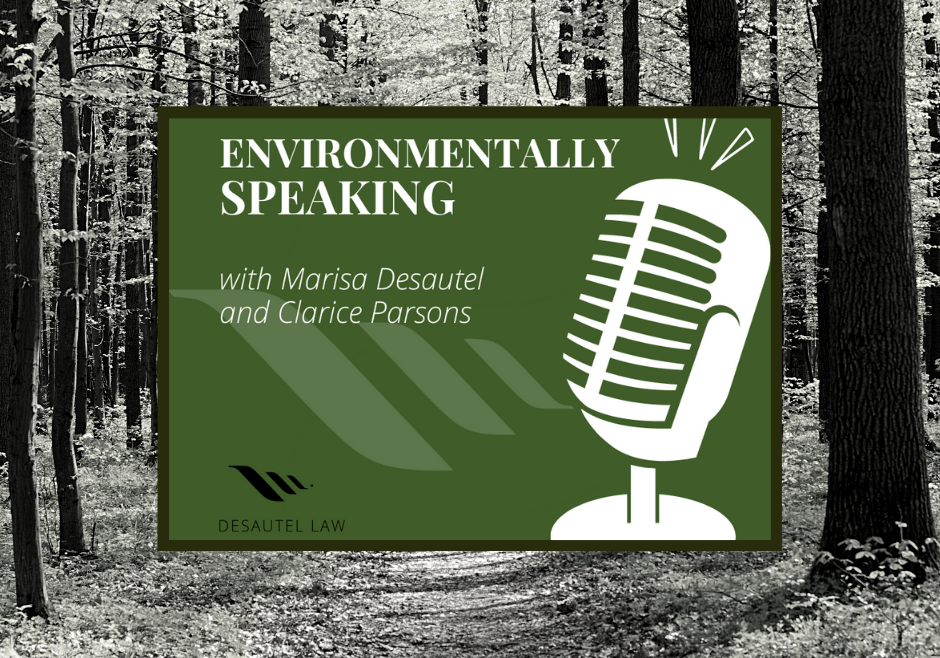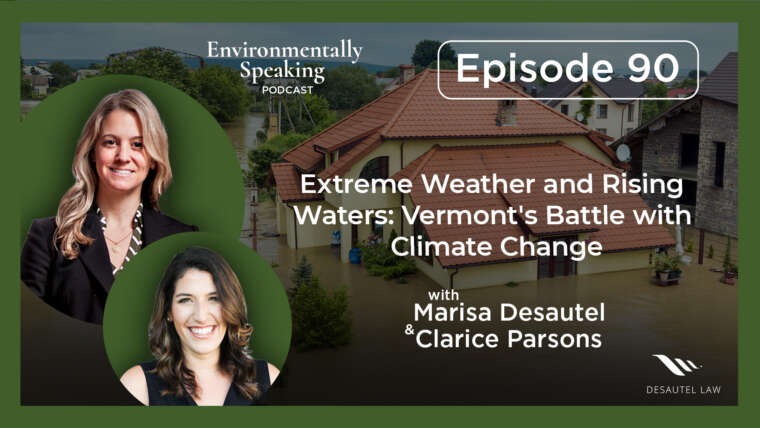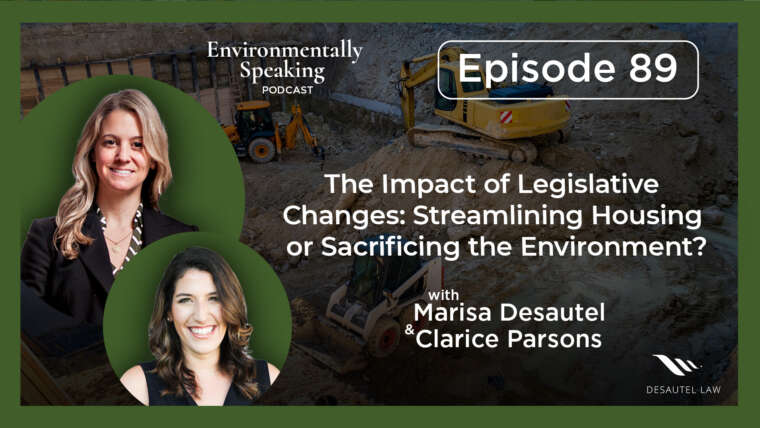LISTEN NOW:
EP 007 – The Aftermath of Hurricane Ida in Rhode Island
MARISA: Hello, everyone. This is Environmentally Speaking. I am Marisa Desautel an environmental attorney with a few decades of experience.
CLARICE: Hey, everybody. I’m Clarice and I’m going to be bringing your questions and topics to the table for discussion. And today we are coming to you pseudo live. It’s prerecorded from the aftermath of the storm. We just had a heck of a tropical storm yesterday September 1st. What a way to ring in the fall.
MARISA: Hurricane Ida, right, the remnants of it?
CLARICE: I think so. I didn’t know they gave her a name, but [inaudible].
MARISA: No. No. And we’re on Aquidneck Island in Rhode Island, so there’s a lot of islands there. As you can imagine the carnage created by the storm surge that came through overnight last night is pretty severe.
CLARICE: Yeah. Oh, sorry. I was going to say it was pretty substantial even on my street in Massachusetts some trees down.
MARISA: So with all of that as the backdrop, Clarice and I thought it would be a good opportunity to talk about storm water.
CLARICE: Storm water.
MARISA: Storm surge and climate change, how all of these things are super relevant right now.
CLARICE: Yeah.
MARISA: So those of you that –
CLARICE: [inaudible].
MARISA: What?
CLARICE: Sorry. I was just saying it’s super relevant especially when it comes into your own basement.
MARISA: Oh, yeah. Yeah. Clarice was kind enough to bring over her wet/dry vac this morning for the water in my basement. All right. Let’s get to it here. People want to know about storm water. So for those of you that don’t know what it is, storm water is pretty much what it sounds like. It’s water that flows after a storm. And I’m sure everyone has seen catch basins in the road as they’re driving along. That is a storm water collection system that you’re looking at with that catch basin, the grates in the road. It’s generally a collection system that’s managed by the municipality in which it’s located and it is meant to convey storm water from the street to the ocean or another discharge point. They can be problematic.
CLARICE: [inaudible].
MARISA: Yeah.
CLARICE: Why even have that?
MARISA: Because of flooding.
[0:02:57] CLARICE: So essentially we just need a place to – so I’m just thinking essentially we just need some place to catch all of this excess in order to process it, to redirect it.
MARISA: That’s right. Once humans decided to pave everything and cut trees down and move forward with progress and development, the pavement obviously does not allow for storm water, rainwater to permeate because it’s an impervious service. So the storm water has nowhere to go. Normally it would collect on the ground and then just soak into the soil, but it doesn’t have that option. So what do you do. In the ‘70s with the advent of the clean water act, federal government and legislature said you cannot discharge a pollutant to a water of the state. So when I talk about storm water, I always say it is the last bastion of environmental law because that’s exactly what you’re doing with these storm water conveyance systems.
You are taking storm flow. You are collecting it into a catch basin where it’s already been on the street collecting pollutants from cars as they’re driving along, trash in the street, salt. And the storm water conveyance system then brings that storm water to a discharge point. For example, here in Newport where our office is located the storm water collection system discharges to the ocean, so everything that’s on the road makes its way into the ocean. And under the clean water act, you’re not supposed to do that, but no one’s figured out a better way to deal with this. So we’re stuck with conveyancing of storm water and carrying all kinds of nasty stuff into our oceans. So it’s upsetting. I mean, it’s exciting to have a hurricane, for sure, but for me I’m thinking about all the debris that is now in the ocean.
CLARICE: And so it sounds like it’s terrible enough that storm water is carrying all of the junk and dirt and pollutants from the street out into the ocean. And that sounds like one problem on its own. But how does all of that connect back to climate change?
[0:05:36] MARISA: The severity, duration, and frequency of hurricanes is increasing because the earth’s atmosphere is warming. The earth’s oceans are warming. If you know anything about hurricanes you know that they pick up speed and intensity when they’re moving over warm water. So as our oceans are warming, these hurricanes are getting more fuel. And it’s a vicious and endless cycle because the warmer it gets, the more hurricanes you have, the more destruction it causes, the more infrastructure we have to build to deal with that destruction. And the natural processes that the planet has in place are significantly impacted, so we’re going to see more storms like we did last night and more storm water is going to end up in the oceans and more pollution.
CLARICE: So my dad isn’t just being a dad when he stands in the big window and says, the weather wasn’t like this when I was a kid? There’s actually something to it. It is actually windier than normal.
MARISA: Yeah. I mean, if you believe the science, yes. And I do believe the science, so, yeah. It’s troubling. It’s upsetting. I mean, it’s the reason I went into environmental law is to try to help. But I’ll be honest, there are some days where I just scratch my head and have no idea if what I’m doing is actually helping. So doom and gloom for today, I guess. But in terms of the storm surge last night everyone received a flash flood warning in Rhode Island on their own as an emergency alert. Massachusetts, too, Clarice?
CLARICE: Yeah.
MARISA: Yeah.
CLARICE: Yeah. We had a couple of warnings.
MARISA: So we can expect more of those.
CLARICE: So right now all of the storm catches are collecting all of the extra rain that’s coming in and all of that now polluted water. Is it literally going from the street into the ocean? Is there anything happening in between?
MARISA: Well, keep in mind that storm water and municipal wastewater septic system or nonseptic system but municipal sewer are not part of the storm water collection system, so we’re not dealing with black water, you know, human waste going into the system. There are situations where there’s a wastewater treatment plant upset and you see those kind of discharges. And then you see shellfish closures because there’s human bacteria, bacteria from humans in the shellfish population, so that’s horrendous. At least we’re not dealing with that every time there’s a rainstorm. But, yes, essentially these storm water collection systems are meant to capture overland street flow and move it to another water body. You didn’t know that, huh?
[0:08:56] CLARICE: I was really hoping for a better answer. I don’t know why. I started with that question and I was like, she’s going to say something beautiful like they filter it and it turns into drinking water.
MARISA: No.
CLARICE: No.
MARISA: So remember when I said the storm water is the last bastion of environmental law?
CLARICE: Yes.
MARISA: This is the thing. We need a better process. We need a better process because these storms are going to continue to increase in frequency, duration, you name it. I think it’s time with climate change. Hopefully most people accept that it’s a real thing. But with climate change actually occurring like we’re seeing – we’re seeing it now. Storm water is a major issue and I would love to see a better program in place at the federal level for storm water collection by municipalities and a better more robust plan for the state of rode island because, you know, we’re the ocean state and a lot of our industry relies on ocean as a tourism, for industry and especially after something like last night.
You know, my lawn furniture got swept into the river that goes through my house into the ocean, so that’s – my lawn furniture is in the ocean somewhere right now. It’s very upsetting. But you don’t want to see that. You don’t want to see pollutants in the ocean every time there’s a storm such that the ocean state and its economy is negatively impacted. So it’s got ramifications far beyond just environmental law. I mean, it will impact the economy.
CLARICE: This will really eventually hit all of Rhode Island.
MARISA: Yeah.
CLARICE: Well, so for today on that bummer note we’re going to have a little bit of homework for everybody. Do some research. Find out what’s going on in your municipality. Is your water going right into the ocean? Does your town have anything in place? Are there discussions to have anything put in place to fix this? This sounds like a silent talking nobody’s talking about, so don’t be afraid to look into it a little bit more. See what’s going on in your town. And, I don’t know, get loud. Do something that will prevent this bummer from continuing.
MARISA: Yeah. I could not agree more. Citizens really do have the power to make change and starting at your town hall is a great place. So I echo what Clarice is saying.
CLARICE: Well, that was a lighthearted episode. If anybody has any topics that are exciting or hopeful or if anybody has any positive environmental change, please send it to us. Apparently we need it. Reach out at Help@DesautelESQ. And we’re just going to – we’re going to laugh through this.
[0:12:06] MARISA: Okay.
CLARICE: Laugh through this heartache.
MARISA: Great. Thanks, Clarice.




